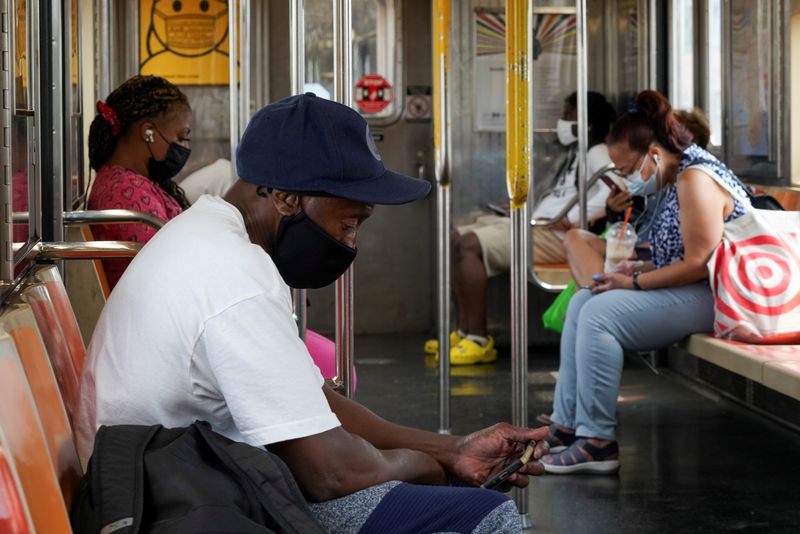By Maria Caspani, Rich McKay, Brendan O'Brien and Tim Reid
NEW YORK/ATLANTA (Reuters) - The fast-spreading Delta variant of the coronavirus is worrying some U.S. commuters who are already back on crowded buses and subway cars as corporate America attempts a greater return to the workplace after more than a year of pandemic disruption.
For New York City resident Bernice Donkor, whose subway commute takes more than one hour each way, it is already hard to snag a seat.
"I've been very worried," said the 28-year-old city worker. "I try to protect myself -- hand sanitizing, washing my hands the minute we get to the office and, of course, at home."
In Atlanta, 69-year-old Scott Monty wore a blue face mask as he waited for the bus earlier this week. He was headed to an office that had recently reopened.
"I have hypertension, and I am old, so I need to be careful. So I say a prayer to the Lord," said the semi-retired accountant. "I have a mask and I have God."
For a few months earlier this year, the pandemic ebbed as vaccines became widely available and states loosened most restrictions, allowing some aspects of daily life to resume.
Infections declined, COVID-19 hospital wards emptied, and some businesses began asking remote employees to head back to the office after working from home for more than a year.
With the highly-contagious variant now spurring a rise in U.S. coronavirus cases, a rethink is underway.
The White House announced Thursday that people working for the federal government, the largest employer in the United States, will have to show proof of vaccination or wear masks, practice social distancing and get regular tests.
Tech giants like Alphabet (NASDAQ:GOOGL)'s Google said this week that all their U.S. employees must get vaccinated to step into offices. But Microsoft (NASDAQ:MSFT)'s LinkedIn is now allowing most employees to work fully remote.
In schools, the U.S. Centers for Disease Control and Prevention (CDC) recently recommended that all students and staff wear masks regardless of vaccination status.
PANDEMIC PLUNGE
Public transport ridership had plummeted across U.S. cities during the pandemic.
New York subway ridership remains down about 50% during the weekdays, according to the Metropolitan Transit Authority, the largest transit system in the country.
The San Francisco-Bay area's BART system had an average of 47,000 weekday riders during the first quarter of 2021, about one-ninth of ridership before the pandemic. But BART ridership has started to rebound - it was more than 88,000 Wednesday, up from about 70,000 two months ago.
COVID-19 transmission on public transit is difficult to determine given the mitigation measures such as masking and social distancing put into place early in the pandemic, said Dr. Amesh Adalja, an infectious disease expert at the Johns Hopkins Center for Health Security in Baltimore.
Mass transit systems located in areas with high vaccination rates are best positioned to avoid outbreaks, he added, but "it's inevitable that there's going to be spread and transmission on those cars between unvaccinated individuals."
Many subway and bus riders turned to cars and bikes during the pandemic.
By October last year, the average daily number of Citi Bike rides taken by New Yorkers rebounded from pandemic lows recorded in April 2020 to levels higher than for the same month in 2019, according to New York City's bike-share program https://www.citibikenyc.com/system-data/operating-reports.
Sebastian Tordilla, 17, said he can't wait to get his driver's license so he can get off Los Angeles buses.
"It’s become very crowded in there, lots of people don't wear masks, there's this new variant, it's very claustrophobic," said the student and part-time restaurant worker.
Other commuters, such as Atlanta chef Chris Rabideau, are less concerned.

Rabideau, who is fully vaccinated, was reading a dog-eared paperback on a blistering afternoon as he sat on bus bench, awaiting the No. 6 to take him to work.
"No, COVID and Delta and whatever's next doesn't bother me. I'm just living my life," said a mask-less Rabideau, 46. "If it comes to it, I'll wear masks again, but right now I'm cool."